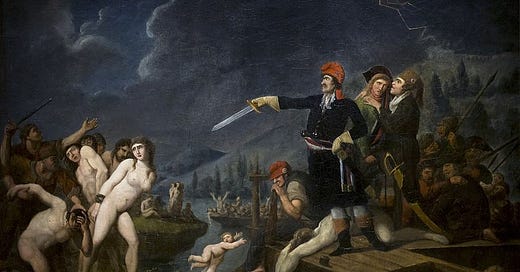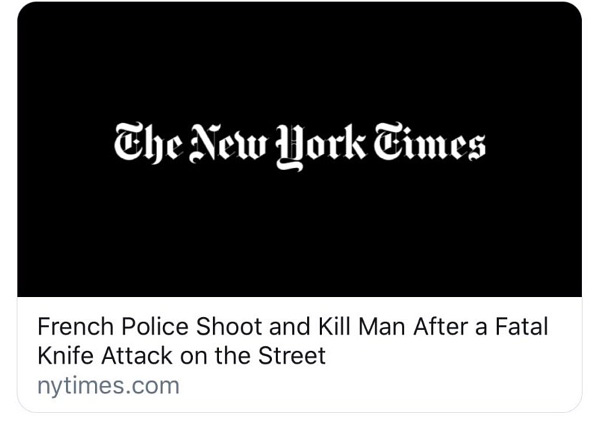
Allons enfants de la laïcité
Why the French notion of religious freedom is different than the Anglo Saxon one, and possibly even better
At the hour when one discerns a final combat—already lost—to defend Enlightenment values against magical propositions, one must promote a post-Christian secularism, effectively atheist, militant and radically opposed to any choice between Western Judeo-Christianity and the Islam that opposes it: not the Bible nor the Koran.
-Michel Onfray, Traité d'athéologie (2005)
The Anglo Saxon world, in both its British and American manifestations, has been so utterly successful in the past two centuries, it’s easy to lose sight of just how weird it really is.
Take, for example, the issue of national ID cards. No Anglo country on the planet has a national ID card (though there have been short-lived attempts) due to this English-language obstinacy around a central government defining your identity. Instead, various stopgaps like state driver’s licenses perform the exact same function, just more wastefully and duplicatively. The rest of the Western world, from Latin America to Continental Europe, all shrug and have their CNI (France), DNI (Spain), or local versions thereof. The end result is the same, though achieved via very different ends and with different levels of statism.
That Anglo exceptionalism constitutes more than mere cultural eccentricity in the case of religious freedom. Consider the escalating bagarre over French President Macron’s reaction to the decapitation of Parisian schoolteacher Sam Paty, one of those cultural collisions increasingly rare in a homogenized Western world. After the English-speaking press displayed a remarkably accusative tone to their coverage (unlike coverage of earlier terrorism in France, where such incidents are sadly common), French elites have responded with a steely Gallic defiance against massed opponents that hasn’t been seen since the Battle of Austerlitz.
All of France saw enormous demonstrations in support of Paty, followed by a fiery speech from Macron where he vowed to “decapitate the Islamist organizations” and “fight to the death”. Macron then inveighed against two editorials in Politico.eu and Financial Times that criticized his government’s position (the pieces were later retracted). Then there was a he-said/she-said telenovela with the Times media columnist and drama lightning-rod Ben Smith about who called whom first for an interview (the French claim Smith called first).


By and large, English-language commenters view French laïcité as an American tourist does their first bidet: uncomprehendingly and with vague feelings of disgust at a bizarre-seeming practice. The issue is a fundamental difference in how the two cultures frame freedom of religion, one that the American commentariat, thanks to their imperial privilege of rarely encountering a differing opinion, grapple to understand.
Freedom of religion versus freedom from religion
The chasm in French versus American understanding of freedom of religion goes back to the revolutionary founding of both republics, and what new world order their respective founders endeavored to realize.
Congress shall make no law respecting an establishment of religion, or prohibiting the free exercise thereof….
First Amendment, Bill of Rights
The American revolutionaries mentioned ‘the Creator’ here and there in their founding documents—the constitutions of all 50 states mention God somewhere—and the First Amendment prohibited any official ‘establishment’ of state religion (origin of the eponymous ‘Establishment Clause’ in American jurisprudence). It’s clear the Founding Father intended the nascent republic to have freedom of religion, meaning freedom of conscience in which the state would neither feature nor favor any sect or cult.
But Americans themselves never really stopped being a nation of religionists: every American president, Democrat or GOP, has at least made a sop to formal religion either rhetorically or via public (and staged) attendance of church services.
By contrast, the French revolutionaries immediately began massacring priests and nuns, seizing church possessions and selling them off to fund their wars of survival against other European powers, all the while extirpating every element of religion from public life down to the Christian calendar¹. In Nantes, thousands of the revolution’s opponents, countless clergy among them, were massacred in so-called noyades where bound prisoners were thrown into the Loire to drown. In the Vendée region, a Catholic royalist counter-revolution was suppressed by the use of colonnes infernales (‘infernal columns’) of revolutionaries who burned everything before them, including tens of thousands of French pro-Catholic civilians. Notre Dame cathedral, symbol of the nation, was ransacked and then used to stage an absurd Fête de la Raison—part of the new state-sponsored atheist religion—where toga-clad young citoyennes LARPed as the goddesses of Truth and Reason².
The founding document of that republican revolution also mentions liberty of conscience, but in a rather different light than the US Constitution.
Nul ne doit être inquiété pour ses opinions, même religieuses, pourvu que leur manifestation ne trouble pas l'ordre public établi par la Loi.
Nobody should be troubled by their opinions, even religious ones, so long as their expression does not trouble public order as established by law.
-Article X, Déclaration des Droits de l'Homme et du Citoyen de 1789
The American government is prohibited by the Constitution from playing a role in religious life. By contrast, in France the government is charged with removing religion from French public life, no matter how heavy-handedly. The only difference between then and now—the only reason this became the brouhaha it has—is that the adversarial pose is toward a foreign religion rather than a more native one. One imagines the Times opinion writers would be rather less annoyed if the religion that was the butt of French dirigisme was the historical one of Catholicism rather than the novel one of Islam.
To tamp down some of the blowback in both the English-speaking world (and even more heatedly) the Muslim world at Macron’s unyielding remarks, Macron gave a wide-ranging interview to, who else?, Al-Jazeera. In the first few minutes, Macron asserts that the republic was built by extracting it from religion. He’s not using a metaphor: religion was cut out of national life like a cancerous tumor (and with a very imprecise scalpel). Macron cites a year—1905—a reference to the year the French law that imposed a quasi-total erasure of religion from public life, as the defining reference point. Under laïcité, the deletion is to be total, and ideally (though not always) equitable. Paty himself once asked a Christian student to remove a publicly-visible cross from her neck.
By contrast, Americans have never really dropped their religiosity, at least not by French standards. Consider the patriotic ritual enacted every time a president or other elected official takes office: the office-holder takes their oath of office with their hands on a bible or other religious book. In France this would be considered outrageous and absolutely illegal. Americans rejoice in their folksy patriotic way about how everyone can have their choice of book, and salute the diversity of scriptural choice as a sign of pluralism; the French would ban the use of any book whatsoever, and throw whatever scripture—Bible, Torah, Koran, whatever—right out the window if anyone tried.
A struggle is as much defined as much by its enemies as its friends. Anglo-style secularism is a product of the Protestantism against which it serves as bulwark: fractured, of diffuse authority, and where religious practice is deeply personal. Laïcité is a result of a Catholic opponent: consolidated, monolithic, hierarchical, with a history of direct political meddling and where religion is definitionally institutional.
In the United States, public figures wear their religion publicly, even enthusiastically, as part of their brands. In France, an individual is a citizen first, and only secondarily a Catholic, Jew or Muslim, and only insofar as the latter not contradict the former. To those who would unplug from the republican project, Macron has a simple response: pas chez nous (not in our house). You are a citoyen first, and something else second. Macron repeats concitoyen (fellow citizen) constantly throughout his interview, perhaps to avoid the français which would make him sound like the French far right which has a rather more ancestral notion of Frenchness.
Citoyens. Citizens: constituents of a polity who both enjoy, and are enjoined by, the liberties both safeguarded and imposed by the republican state, itself elected to power by the very people it molds into citizens. It’s a word rarely heard in the Anglophone sphere other than in discussions of immigration policy: in the US, once you’re in you’re in, and no other strictures apply. In France, citoyenneté is a civic persona, separate from the personal, that everyone must assume in their public lives.
“Our model is universalist, not multiculturalist.” He uses the word “multiculturalism” as some suspicious foreign concept, not as the self-evident, beneficent telos of every society (what it’s become in the Anglo world). This view no doubt seems outmoded if not outright anachronistic in the English-speaking world. But to those raised in this tradition, l’état as guarantor of a religion-free civic life is a consolation, the referee on the football field who ensures certain civic norms are strictly enforced.
A struggle is as much defined as much by its enemies as its friends. Anglo-style secularism is a product of the Protestantism which it opposes: fractured, of diffuse authority, and where religious practice is deeply personal. Laïcité is a result of a Catholic opponent: consolidated, monolithic, hierarchical, with a history of direct political meddling and where religion is definitionally institutional.
Unlike in the American world where the once-famed civic religion that Tocqueville described so glowingly is now almost wholly non-existent, the French Republic offers ideological armor against movements whose values conflict with the Enlightenment project as undertaken by the heirs of Voltaire (though clearly not John Locke). In France, there’s less of the constant hand-wringing and pearl-clutching about ‘tolerating intolerance’ or ‘the limits of tolerance’. That said, the state, in its role of état-patron, feels that defending religious liberty also means actively policing anti-religious or racist speech. In an ironic inversion, France has stronger hate speech laws than the US and the state has indicted more than one writer or artist for something they said, but a much less judgy intellectual culture where ‘cancelation’ is still a foreign concept.
By contrast, the American Enlightenment project has been ideologically captured either by nationalism on the right, or militant identitarianism on the left that’s an increasingly parochial caste system irrelevant to anyone outside of the United States. Or even inside for that matter. There’s almost no there there anymore in American political centrism, other than the thinnest of platitudes which crumble in the face of pissy activism from either left or right.

Unlike the United States, that’s gone completely squishy on its founding values, the values of the French Republic are quite clear. They’re etched right there over the doorway of almost every school and public building (including the collège du Bois d’Aulne where Paty taught): Liberté, Égalité, Fraternité. They’re even etched above some churches which the state owns, a practice that dates back to the French Revolution when priests were made state functionaries (the ‘refractory’ priests who refused where hunted down and either imprisoned or executed). Those words aren’t mere patriotic enthusiasm; the state takes it upon itself to not only defend those values, but impose them if necessary, and straight from the cradle too.
Which brings us finally to Macron’s most polarizing proposal: prohibiting the establishment of separate Muslim schools. Homeschooling, save for medical need, is to be prohibited in France. The path to being citoyen begins in maternelle (pre-school), and no French citizen is to be spared (and it’s not only Muslims impacted; most unlicensed private religious schools in France are Catholic).
Americans will howl, but such noted right-wing ideologues as Angela Merkel declared multiculturalism to be dead as a European experiment as early as 2010. Integration need not mean the folksy American cliché of a ‘melting pot’ (read: a cultural chaos with near-zero social glue and tattered social safety net). Europe will not follow in America’s footsteps here, even if it’s France today (per usual) being loudest about it.
As with ID cards, the Anglo world rejects any state imposition of national identity, preferring instead the de facto assimilation of new arrivals into citizens via mass media and generational amnesia. In France, the state stamps the citizen’s character with the same phrase it puts on that state-issued ID card: nationalité française.
Both cultures produced a revolutionary republicanism that transformed the world; both make universalist claims as to the applicability of their models to outsiders; both cultures maintain liberal democratic experiments in an increasingly borderless world. Americans should perhaps be a bit more multicultural in their multiculturalism, and understand that the other late 18th-century democratic revolt has some ideas all its own.
Which makes reading about the French Revolution a pain in the ass, as you’re constantly translating from the now-defunct revolutionary calendar to our current Gregorian one. When was 18 Brumaire, An VIII again?
A mere fourteen years later, after all that equalizing, atheist revolutionary fervor, Notre Dame would serve as the mise en scène for Napoleon’s coronation, with a press-ganged Pope Pius VII showing up (only to be spectacularly snubbed).
It’s intriguing with what regularity the banishment (or literal demolition) of religion from the public square leads to some brief fit of secular humanism before being quasi-instantly replaced by the worship of a man. Not Man writ large….one dude, whether Napoleon, Stalin or Castro. I posit that there’s a Conservation of Religion operative in all human societies: religion is never created nor destroyed, only sublimated into different forms, often in atavistic (if non-obvious) resurrections of earlier forms thought long dead. We’re in such a resurrection of Protestant social-justice millenarianism now.







Did you read Packer's article on Paris' banlieues in the New Yorker a few years back? Touched on how laicite interacts with the Muslim communities
THANK YOU
Just having this kind of historical context is, itself useful. The kind of watered-down crap that passes for intellectual discourse in America is frustratingly obtuse. I had only the vaguest sense that there was this difference in French attitudes about religion in society; i hadn't considered the roles the catholic church played in France vs. England and America.